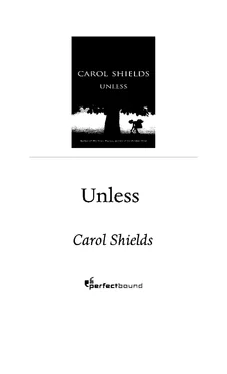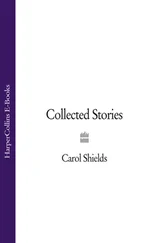Carol Shields - Unless
Здесь есть возможность читать онлайн «Carol Shields - Unless» — ознакомительный отрывок электронной книги совершенно бесплатно, а после прочтения отрывка купить полную версию. В некоторых случаях можно слушать аудио, скачать через торрент в формате fb2 и присутствует краткое содержание. Жанр: Современная проза, на английском языке. Описание произведения, (предисловие) а так же отзывы посетителей доступны на портале библиотеки ЛибКат.
- Название:Unless
- Автор:
- Жанр:
- Год:неизвестен
- ISBN:нет данных
- Рейтинг книги:4 / 5. Голосов: 1
-
Избранное:Добавить в избранное
- Отзывы:
-
Ваша оценка:
- 80
- 1
- 2
- 3
- 4
- 5
Unless: краткое содержание, описание и аннотация
Предлагаем к чтению аннотацию, описание, краткое содержание или предисловие (зависит от того, что написал сам автор книги «Unless»). Если вы не нашли необходимую информацию о книге — напишите в комментариях, мы постараемся отыскать её.
Unless — читать онлайн ознакомительный отрывок
Ниже представлен текст книги, разбитый по страницам. Система сохранения места последней прочитанной страницы, позволяет с удобством читать онлайн бесплатно книгу «Unless», без необходимости каждый раз заново искать на чём Вы остановились. Поставьте закладку, и сможете в любой момент перейти на страницу, на которой закончили чтение.
Интервал:
Закладка:
The conjugation and (sometimes) adverb unless , with its elegiac undertones, is a term used in logic, a word breathed by the hopeful or by writers of fiction wanting to prise open the crusted world and reveal another plane of being, which is similar in its geographical particulars and peopled by those who resemble ourselves. If the lung sacs of Norah’s body hadn’t filled with fluids, if a volunteer at the Promise Hostel hadn’t reported a night of coughing to Frances Quinn, and if Frances hadn’t called an ambulance, we would never have found Norah at the Toronto General.
By chance it was a Friday, the day Tom drives by the corner of Bathurst and Bloor for a glimpse of her. She was not there. For the first time since April she was not there.
Unless, unless. He rang the bell at the hostel and was told she had gone into the hospital early in the morning, but, since Norah was of age, over eighteen that is, Frances Quinn was not at liberty to say which hospital. Tom decided to phone them all. Has a nineteen-year-old girl with a heavy rash on her wrists been admitted? Yes — lucky on the third call — she had been checked in that day.
Unless. Novelists are always being accused of indulging in the artifice of coincidence, and so I must ask myself whether it was a coincidence that Norah was standing on the corner where Honest Ed’s is situated when a young Muslim woman (or so it would appear from her dress), in the month of April, in the year 2000, stepped forward on the pavement, poured gasoline over her veil and gown, and set herself alight. No, it is not really a coincidence, since Norah was living in a basement apartment close by, with her boyfriend, Ben Abbot. She had walked over to Honest Ed’s to buy a plastic dish rack, which she was holding in her hand when the self-immolation began. (Why a plastic dish rack? — this flimsy object — its purchase can only have evolved from some fleeting scrap of domestic encouragement.) Without thinking, and before the news teams arrived, Norah had rushed forward to stifle the flames. The dish rack became a second fire, and it and the plastic bag in which it was carried burned themselves to Norah’s flesh. She pulled back. Stop, she screamed, or something to that effect, and then her fingers sank into the woman’s melting flesh — the woman was never identified — her arms, her lungs, and abdomen. These pieces gave way. The smoke, the smell, was terrible. Two firemen pulled Norah away, lifting her bodily in a single arc, then strapped her into a restraining device and drove her to Emergency, where she was given first aid. A few minutes later, though, she disappeared without giving her name.
If the firemen hadn’t pulled her away in time, if Honest Ed’s exterior security video hadn’t captured and then saved the image of Norah, her back anyway, her thrashing arms, instantly recognizable to members of her family, beating at the flames; if they hadn’t turned the video over to the police, unless, unless, all this would have been lost. But it’s all right, Norah. We know now, Norah. You can put this behind you. You are allowed to forget. We’ll remember it for you, a memory of a memory, we’ll do this gladly.
Unless we ask questions.
If I hadn’t asked Danielle Westerman point-blank last week what it was that interrupted her childhood. Was it her mother or her father? I put it baldly. Her mother, Danielle said. She was eighteen, but had lived in fear most of her life; her mother had tried to strangle her when she stayed out late one night. She left home immediately, the next day, with only a hundred francs in her pocket and a train ticket to Paris.
Why have you been so silent all these months? I asked my mother-in-law, Lois. Why didn’t you tell us what was wrong?
Because no one asked me, she said.
But Arthur Springer did ask you?
Yes. He leaned across the kitchen table, his chair scraping on the floor, an oddly deliberate and intimate act, and said, “Tell me all about your life, Lois.”
And you did tell him?
Yes, I’m afraid I did. The poor man. Everything I told you, I told him.
No one, not even Tom, has ever said to me: Tell me all about your life, Reta. No one has ever offered that impelling phrase to Annette or Sally or Lynn. They swear it.
I phoned Arthur Springer and asked him directly: How did it happen that he asked my mother-in-law such an odd and intimate question?
“Well,” he said (abashed, I’m pleased to say). Hmm, he’d learned the technique recently at a publishing workshop on personal relationships that, hmm, Scribano & Lawrence had sent him to; this was after the author of Darling Buds went stomping off to Knopf. Something tactless he’d apparently said, a rather large fuss over a very small nothing. But he was asked to sign up for an immersion weekend on power relationships. Vermont; an old hunting lodge; a half-dozen humbled professionals. The key, he learned from the workshop director, was simple. One had only to ask people — especially writers, but anyone will do — for a recital of their lives, and they fall right into it. It’s a harmless strategy, and effective. He’s only tried it out a few times, but always with enormous success.
“You didn’t say it to me,” I said. “You didn’t ask me to tell you all about myself.”
“Oh. Well, I could. Shall I?”
“No. It’s too late.”
“I’m so sorry, Reta. Really, I mean it. I do want to know all about the real Reta Winters.
One day, when we have time.”
Meanwhile — another one of those signal words — meanwhile, I have brought Thyme in Bloom to a whimsical conclusion — Alicia triumphs, but in her own slightly capricious way — and the book will be published in early fall. Everything is neatly wrapped up at the end, since tidy conclusions are a convention of comic fiction, as we all know. I have bundled up each of the loose narrative strands, but what does such fastidiousness mean? It doesn’t mean that all will be well for ever and ever, amen; it means that for five minutes a balance has been achieved at the margin of the novel’s thin textual plane; make that five seconds; make that the millionth part of a nanosecond. The uncertainty principle; did anyone ever believe otherwise?
Scribano & Lawrence expect a reasonable success. Mr. Springer withdrew his editorial reservations when My Thyme Is Up was analyzed exhaustively in an essay for The Yale Review by none other than Dr. Charles Casey, the octogenarian dean of humanities. The article, which came out in February, is a surprise reappraisal and appreciation, and the buzz has been picked up by the popular press, even Entertainment Weekly. The subversive insights of the novel had not been grasped, it seems, by its original reviewers two years ago. A correction is in order. What was simple is now seen as subtle. A brilliant tour de force, says Professor Casey, and this quote will, of course, appear on the cover of the sequel. The name Dr. Charles Casey will be printed in the same size type as the name Reta Winters, but I am trying not to think what that means. And I’ve noticed something else: Professor Casey’s clever perspective has caused a part of my mind to fly up to the box-room skylight, from whence it looks down on me, mockingly.
Danielle Westerman has given up on me. She has decided to translate her own book, and the portions she has shown me are both accurate and charming — yes, charming, that concept I thought I had given up on — but now I see that charm can be a gesture toward the authentic when it allows itself to be caught in the wings of an updraft and when it pushes its way into a different kind of cultural weather. She translates about a page a day, which she faxes to me for tweaking; I send it back within the hour, thinking every time I push the start button: What an elegant machine this is, sitting in its own corner so wise and respectful and willing when compared to the ugliness of an e-mail. She is adding to her memoir, writing about her mother, admitting, finally, that a memoir must have a mother somewhere in its folds. The two identities she never reconciled — daughter, writer — are coming together. Translation is keeping her mind sharp, she says, like doing a crossword puzzle. A daily task to begin and complete. She’s just turned eighty-six.
Читать дальшеИнтервал:
Закладка:
Похожие книги на «Unless»
Представляем Вашему вниманию похожие книги на «Unless» списком для выбора. Мы отобрали схожую по названию и смыслу литературу в надежде предоставить читателям больше вариантов отыскать новые, интересные, ещё непрочитанные произведения.
Обсуждение, отзывы о книге «Unless» и просто собственные мнения читателей. Оставьте ваши комментарии, напишите, что Вы думаете о произведении, его смысле или главных героях. Укажите что конкретно понравилось, а что нет, и почему Вы так считаете.












